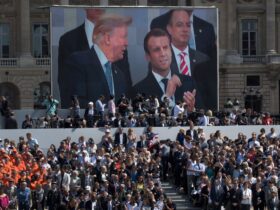Attorneys for FBI agents who investigated the Jan. 6 attack on the U.S. Capitol told a federal judge on Wednesday that they cannot trust that the Justice Department will not give their names to President Donald Trump purely so he can retaliate against them.
As a civil lawsuit against the DOJ has gone through the court system, the government has been consistently “vague” about what it intends to do with the list of the roughly 5,000 agents who investigated the 2021 attack on the U.S. Capitol, attorney Margaret Donovan told U.S. District Judge Jia Cobb.
Deputy Attorney General Emil Bove, who was formerly Trump’s personal lawyer, demanded the FBI turn over the names of the agents in February, after Trump signed an executive order he said would end the “weaponization” of the federal government.
In a memo to the Justice Department, Bove echoed the president’s unsubstantiated grievances with the Biden administration and its so-called “unprecedented, third-world weaponization of prosecutorial power.” The only way to resolve that, Bove wrote, was to engage in a “review” of the Justice Department.
“The Department has already started this process but much more work is required. No one who has acted with a righteous spirit and just intentions has any cause for concern about efforts to root out corruption and weaponization,” Bove wrote.
Instead of clearly investigating corruption or weaponization in thousands of Jan. 6 cases and building outward from there, however, the Trump administration has started by forming a list of names of anyone who worked on Jan. 6 cases.
Trump has a pattern of “pandering” to Jan. 6 defendants-turned-pardon-recipients, many of whom have expressed a desire for retribution against law enforcement officers, Donovan said.
Trump has referred to the defendants as “political prisoners” and “hostages,” and has called for Jan. 6 investigators and prosecutors to be imprisoned. Trump allies such as Elon Musk have not only downplayed the severity of what happened on Jan. 6, but have shown little discretion when it comes to blasting out personal or sensitive identifying information about Trump’s perceived enemies online. In November, Musk reposted a list of government employees on X, the social media platform he owns, prompting a deluge of harassment against them.
If the list of FBI agents is not destroyed or the judge does not order a preliminary injunction — which would bar the government from sharing it outside of the DOJ — there’s little hope that the agents won’t find themselves being targeted for harassment, their lawyers argue.
“If the Department of Justice wants to look at three years of Jan. 6 prosecutions and look for weaponization, have at it,” Donovan said, noting that the department should start by destroying the list of names to keep it from being publicly disseminated.
But the DOJ doesn’t seem to want to do that, she told Cobb.
“We don’t have a Justice Department that won’t agree not to put the lives of 5,000 agents at risk,” Donovan said.
Cobb asked federal prosecutor Dimtar Georgiev-Remmel whether the department would agree to destroy the list.
Georgiev-Remmel demurred when the judge asked him to describe the “process” the government was following for its weaponization review. He suggested the department was merely following Trump’s executive order.
Cobb, who has presided over numerous Jan. 6 cases, appeared puzzled. The government had offered no proof that Jan. 6 charges were fabricated or that there was a pattern of vindictive prosecution.
The judge said she couldn’t just “strike” Trump’s executive order, but the DOJ could at least clarify “what went wrong” with Jan. 6 cases and why they needed to look for so-called weaponization.
“That’s what the internal review is supposed to uncover,” Georgiev-Remmel said.
When Cobb pushed back and said there still must be a “proper purpose,” Georgiev-Remmel circled back to the powers of the presidency and the executive order, and claimed there was “nothing inappropriate” being done.
The list has not been shared with anyone, according to DOJ lawyers. They did not say Wednesday in court what they intend to do with the list in the future.
Georgiev-Remmel told Cobb there was nothing to worry about, seemingly ignoring that the Trump administration has been found out of compliance with judge’s orders in other court cases.
“The government will operate lawfully. There’s no basis to believe anyone will act contrary to law,” he said.
FBI agents on the list argue that having their names all in one place threatens their First Amendment rights. Being on the list, they contend, equates to being under investigation — something they have to disclose when asked about taking on new assignments, for example. Lawyers for the DOJ say the FBI agents are being probed for official conduct, which typically is not all covered by the First Amendment.
Cobb appeared dubious of whether the government would be harmed if she ordered them not to publish the list, especially if they could simply keep it private as discovery in the civil case unfolds.
The matter is now under advisement.
















Leave a Reply